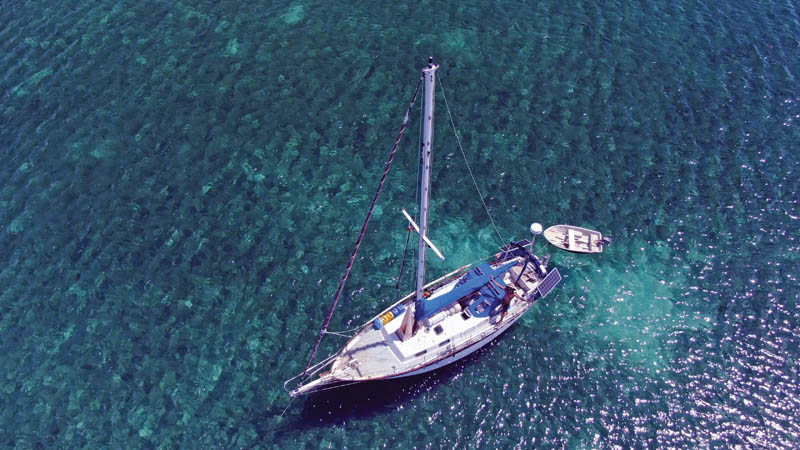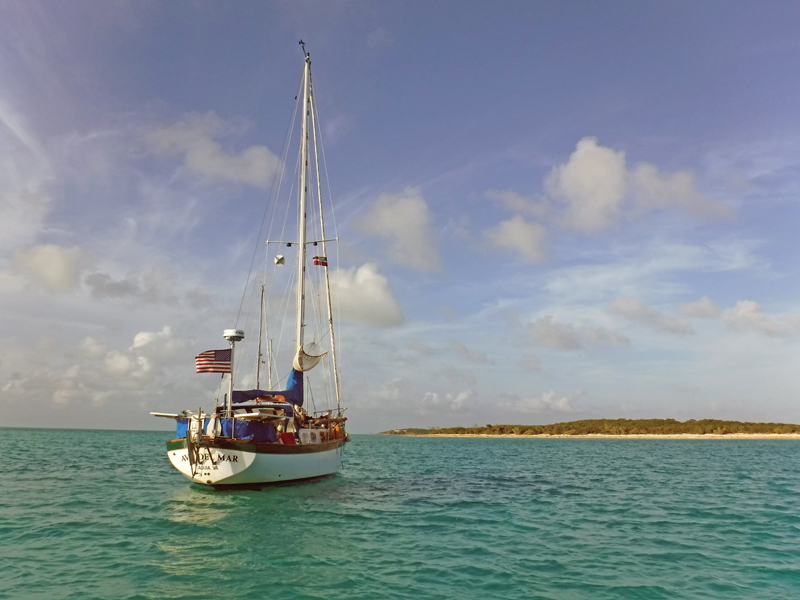Sailing and Life Lessons for 10-Years-Ago John
We were sailing when the squall came out of nowhere. I was off watch but felt it as it fell over the Beneteau 50 sailboat I was helping deliver. Out in the cockpit my friend Peter was hand-steering as the boat heeled dramatically in the wind. There’s a lot of sail area on a boat that size, so we were certainly overpowered—but only for as long as the squall would last. I took a seat and looked at him as he struggled to keep the boat off the wind.

“This is a good one,” I said with a smile. He grinned back. We both knew it wouldn’t last long. We chatted through the shifting winds until the squall had passed over and conditions returned to normal. As it faded away, it occurred to me that I wished I could go back in time to let 10-years-ago John know that squalls pass, that not every increase of wind meant that an epic storm was upon him. There are a lot of things that I wish I could tell 10-years-ago John.
While I may not have been a pessimist, I envisioned every anchorage to be filled with hidden, uncharted dangers and dozens too many boats. I would think, What if I get in there and there’s no room? Yet every time I got in there, there was room, somehow. I lacked the experience to know that there is always a solution: a spot to drop the hook or room to turn around and leave again in search of better fortune.
I’d like to let rookie-John know that every fuel dock will not prove itself to be impossible to attain, that there’s room for his boat and plentiful water under the keel. If not, it wouldn’t be there as a fuel dock. What if there are no cleats is a fool’s narrative, I would tell him. There will be cleats, or pilings, or a person to grab a line. If these aren’t there, another solution will make itself evident. You know how to bail out. You can leave.
Every thump heard underway used to mean that I’d breeched the hull and the ship was about to go down. Calm yourself, noob, I would whisper to the old me. Fiberglass is tougher than you think. You’re going to be okay.

Offshore sailing? Buy the bread, charge the phone, and other bits of wisdom
Other lessons are less dramatic but no less important. No, you are not going to bake bread on an offshore passage, I would tell the old me. I really thought I was. It’s easy. Well, it’s easy until it’s not. Then, it’s miserable, because you forsook the store-bought bread that stays fresh for days because you had to prove yourself, didn’t you? Bobbing about in Mother Ocean is no time to prove much beyond your ability to smear peanut butter on an apple slice (or a fresh piece of bread). Buy the bread, John.
And that dinghy that you insist on rowing? You may want to get your outboard running, because you can’t row everywhere you want to go. Sure, it looks good on paper. No finicky motor means no gasoline to store on the foredeck, no water in the fuel or fouled spark plug to worry you. What good does that do if you can’t go anywhere? It isn’t always easy to row into the trade winds. Perhaps you should prove less and dinghy more. There’s no shame in an outboard.
Vigilance on electric consumption is good, I would tell the former me, but settle down. You don’t have refrigeration. You don’t own a television. Other than navigation lights, a VHF radio, and maybe some music in the background, what do you plan to do with all that extra juice? Silly old John wouldn’t even charge a phone at night. No sun? No charging! was the battle cry. But battle cries are for soldiers, and who decided I was at war? Oh, I did. Or he did, old John. It’s prestigious territory. I was following the greats.
The lessons aren’t over. Of this I am sure, but like Atlantic squalls to a southbound sailor, the lessons come less frequently, with less intensity, and don’t last as long as they used to. Entering the Anguilla Channel on approach to St. Martin, I was on edge, convinced that there may be some weird thing that everybody else knew and that I had somehow missed, some common knowledge that you can’t enter the channel where I did or anchor in the bay where I intended to. I can’t make those thoughts stop any more than I can end a squall, but I’ve learned to stare them down, to understand that caution is good, but the voices are often wrong. Everything will be okay once I get in there.
If not, there’s always something else you can do.
By John Herlig
About the Author: John Herlig lives aboard his 1967 Rawson cutter, Ave del Mar, and teaches at Cruisers University. Find him on Instagram @sailing.ave.




